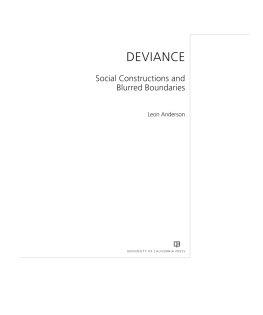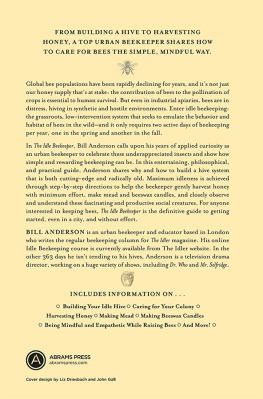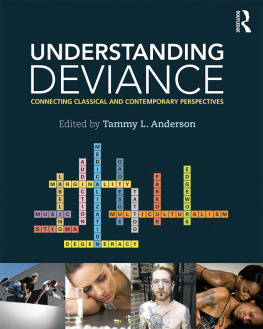Anderson - Deviance - social constructions and blurred boundaries
Here you can read online Anderson - Deviance - social constructions and blurred boundaries full text of the book (entire story) in english for free. Download pdf and epub, get meaning, cover and reviews about this ebook. year: 2017, publisher: University of California Press, genre: Romance novel. Description of the work, (preface) as well as reviews are available. Best literature library LitArk.com created for fans of good reading and offers a wide selection of genres:
Romance novel
Science fiction
Adventure
Detective
Science
History
Home and family
Prose
Art
Politics
Computer
Non-fiction
Religion
Business
Children
Humor
Choose a favorite category and find really read worthwhile books. Enjoy immersion in the world of imagination, feel the emotions of the characters or learn something new for yourself, make an fascinating discovery.
- Book:Deviance - social constructions and blurred boundaries
- Author:
- Publisher:University of California Press
- Genre:
- Year:2017
- Rating:3 / 5
- Favourites:Add to favourites
- Your mark:
- 60
- 1
- 2
- 3
- 4
- 5
Deviance - social constructions and blurred boundaries: summary, description and annotation
We offer to read an annotation, description, summary or preface (depends on what the author of the book "Deviance - social constructions and blurred boundaries" wrote himself). If you haven't found the necessary information about the book — write in the comments, we will try to find it.
Deviance - social constructions and blurred boundaries — read online for free the complete book (whole text) full work
Below is the text of the book, divided by pages. System saving the place of the last page read, allows you to conveniently read the book "Deviance - social constructions and blurred boundaries" online for free, without having to search again every time where you left off. Put a bookmark, and you can go to the page where you finished reading at any time.
Font size:
Interval:
Bookmark:

Leon Anderson

UNIVERSITY OF CALIFORNIA PRESS
University of California Press, one of the most distinguished university presses in the United States, enriches lives around the world by advancing scholarship in the humanities, social sciences, and natural sciences. Its activities are supported by the UC Press Foundation and by philanthropic contributions from individuals and institutions. For more information, visit www.ucpress.edu.
University of California Press
Oakland, California
2017 by Leon Anderson
Library of Congress Cataloging-in-Publication Data
Names: Anderson, Leon, 1950- author.
Title: Deviance : social constructions and blurred boundaries / Leon Anderson.
Description: Oakland, California : University of California Press, [2017] | Includes bibliographical references and index.
Identifiers: LCCN 2017003648 (print) | LCCN 2017006809 (ebook) | ISBN 9780520292376 (pbk. : alk. paper) | ISBN 9780520965935 (ebook)
Subjects: LCSH : Deviant behavior. | Criminal behavior. | Mental illness. | Social interaction. | Social ethics.
Classification: LCC HM 811 . A 57 2017 (print) | LCC HM 811 (ebook) | DDC 302.5/42dc23
LC record available at https://lccn.loc.gov/2017003648
26 25 24 23 22 21 20 19 18 17
10 9 8 7 6 5 4 3 2 1
This book embraces a vision of deviance as a set of social processes involving a wide range of social dynamics and influences, including the multiple influences on human behavior emphasized by many positivistic theories of deviant behavior. The overarching approach of the book, however, is fully grounded in symbolic interactionism. Among the analytic approaches to deviance, only symbolic interactionism (or social construction, as some prefer) moves beyond the limited question of what causes deviant behavior? As valuable as the answers to that question can be, focusing solely on the causes of deviant behavior can give the inaccurate impression that what is defined as deviant behavior is always and everywhere the same. But while all human cultures have made distinctions between good and bad acts, what has been considered good or bad has varied widely. Definitions of deviance are far from universal, even within most societies at any given point in time. Focusing exclusively on the causes of deviant behavior misses more of the deviance process than it captures.
Symbolic interactionism has been critical to the study of deviance since the early 1960s, but in the 1970s popular interpretations of interactionist contributions to the study of deviance focused overwhelmingly on labeling theory. The core insight of labeling theory was the idea that being identified and treated as deviant often leads to increased deviant behavior and role engulfment in a deviant identity. The social contexts in which that insight holds remains an important empirical question, but it is only a piece of what symbolic interaction has to offer to the study of deviance. This book provides instructors and students with a broader interactionist/constructionist analysis of the deviance process, focused on (1) activities of moral entrepreneurs who seek to define certain behaviors and statuses as deviant, (2) thoughts and actions of rule-breakers who knowingly or unknowingly violate the rules, (3) social control efforts focused on identifying and sanctioning or treating rule-breakers, and (4) the responses of rule-breakers to the formal and informal social control efforts directed at them.
The term moral entrepreneur was created by Howard Becker in his 1963 study of the Federal Bureau of Narcotics campaign to define marijuana as harmful and its users as evil. Scholars have found the concept useful for examining the social construction of what Stanley Cohen (1973) terms moral panics related to a wide range of deviance categories. Analysis focused on the creation and dissemination of atrocity tales (Bromley et al. 1979) has provided an additional vantage point to assess the narrative similarities underlying the creation of moral panics related to a wide range of deviance categories. Finally, David Snow and colleagues (Snow et al. 1986a; Snow and Benford 1988) studies of framing processes have provided additional concepts for analyzing deviance that link moral entrepreneurship to social movements, medical discourse, and popular culture.
Rule-breaking has always been a central focus of deviance studies, both from positivistic and interpretive perspectives. While positivistic theories seek explanations for rule-breaking that are external to, or at least largely beyond the control of, those who violate social norms, symbolic interactionism gives voice to the experiences and identities of those who are defined as deviant. Ethnographic research can be valuable in all fields of sociological inquiry, but it is especially critical when seeking to understand the experiences of those who consciously violate social norms. This contribution of symbolic interactionism and ethnographic research is a staple of deviance textbooks. This book continues the tradition of drawing on deviance ethnographies to share deviants voices in their own words. But rather than relying mostly on classic past studies, I have mined the wealth of recent ethnographies for up-to-date descriptions of deviants experiences and voices.
The interactionist/constructionist approach to the deviance process recognizes that normative violations are embedded in broader social contexts that gain particular salience when individuals are identified and treated as rule-breakers. At that point, people who are identified as deviants find themselves subject to formal and informal sanctions and treatment. Often, they are pulled into organizational processing through the criminal justice system or medicalized treatment programs. The societal responses to those identified as specific types of deviants change over time, typically in tandem with changing definitions of the causes and consequences of deviant behavior. But both labeling and treating of deviants can vary enormously based on race, class, and gender. This book draws upon both quantitative and qualitative research to discuss current societal responses and biases in punishment and treatment of different kinds of deviants.
Those identified as deviant seldom passively accept stigmatizing labels and the punitive treatment directed toward them. Instead, they engage in a range of stigma management activities: passing as nondeviant, seeking to minimize the perception of their deviance, embracing recovery, and even at times turning the alleged deviance into a source of pride and power. The options available for resistance and stigma management vary across deviance categories and over time, frequently with race, class, and gender differences.
The deviance process is multifaceted and seldom static for long. What was acceptable and/or legal at one point in time (regular opiate use or prostitution) becomes unacceptable and illegal. What was illegal (use of contraceptives) or considered mental illness (homosexuality) becomes widely accepted. As of this writing, pot is (or soon will be) legally sold for recreational use in eight states, while in many adjacent states and at the federal level selling marijuana is a felony. Prison populations soar, leading even conservative politicians to question mandatory sentencing practices. And the Internet provides venues for both moral entrepreneurship and resistance. The symbolic interactionist/constructionist perspective outlined above provides an analytic framework for understanding deviance as a continually recursive process.
Font size:
Interval:
Bookmark:
Similar books «Deviance - social constructions and blurred boundaries»
Look at similar books to Deviance - social constructions and blurred boundaries. We have selected literature similar in name and meaning in the hope of providing readers with more options to find new, interesting, not yet read works.
Discussion, reviews of the book Deviance - social constructions and blurred boundaries and just readers' own opinions. Leave your comments, write what you think about the work, its meaning or the main characters. Specify what exactly you liked and what you didn't like, and why you think so.










